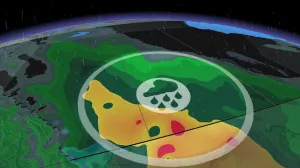
New "super-reactive" compound found floating in the atmosphere
Inhaling hydrotrioxide could potentially have impacts on human health, researchers say.
An international team of researchers has discovered a new type of “super-reactive” chemical compound in the atmosphere that “likely affects” both human health and the global climate.
This chemical compound is hydrotrioxide, which contains three oxygen atoms bonded to each other, making them highly reactive with other compounds. This is the first time that researchers have been able to report direct evidence of hydrotrioxides forming in atmospheric conditions.
The researchers’ study, published in Science, stated that all chemical compounds in the atmosphere can form hydrotrioxides and that these reactive compounds have a lifespan ranging from several minutes to hours.
The study noted that this lifespan length is concerning because this is enough time for the hydrotrioxides to potentially undergo damaging reactions with other compounds in the atmosphere.
One scenario highlighted by the researchers is the potential for hydrotrioxides to penetrate aerosols, which are small particles in the atmosphere that can scatter and absorb sunlight. Some of the main sources of aerosols include smoke from burning plants, emissions from human activity, and volcanic eruptions.
The outcomes of this reaction, for both human health and the climate, have yet to be discovered. However, respiratory and cardiovascular diseases are both currently known impacts of aerosols entering the human body.
“It is easy to imagine that new substances are formed in the aerosols that are harmful if inhaled. But further investigation is required to address these potential health effects," stated Henrik Grum Kjærgaard, senior author of the study, in a press release.
"The discovery suggests that there could be plenty of other things in the air that we don't yet know about. The air surrounding us is a huge tangle of complex chemical reactions. As researchers, we need to keep an open mind if we want to get better at finding solutions," concluded Jing Chen, the study’s second author.
Thumbnail image: High altitude view of the Earth from space. (Elen11/ iStock/ Getty Images Plus)











